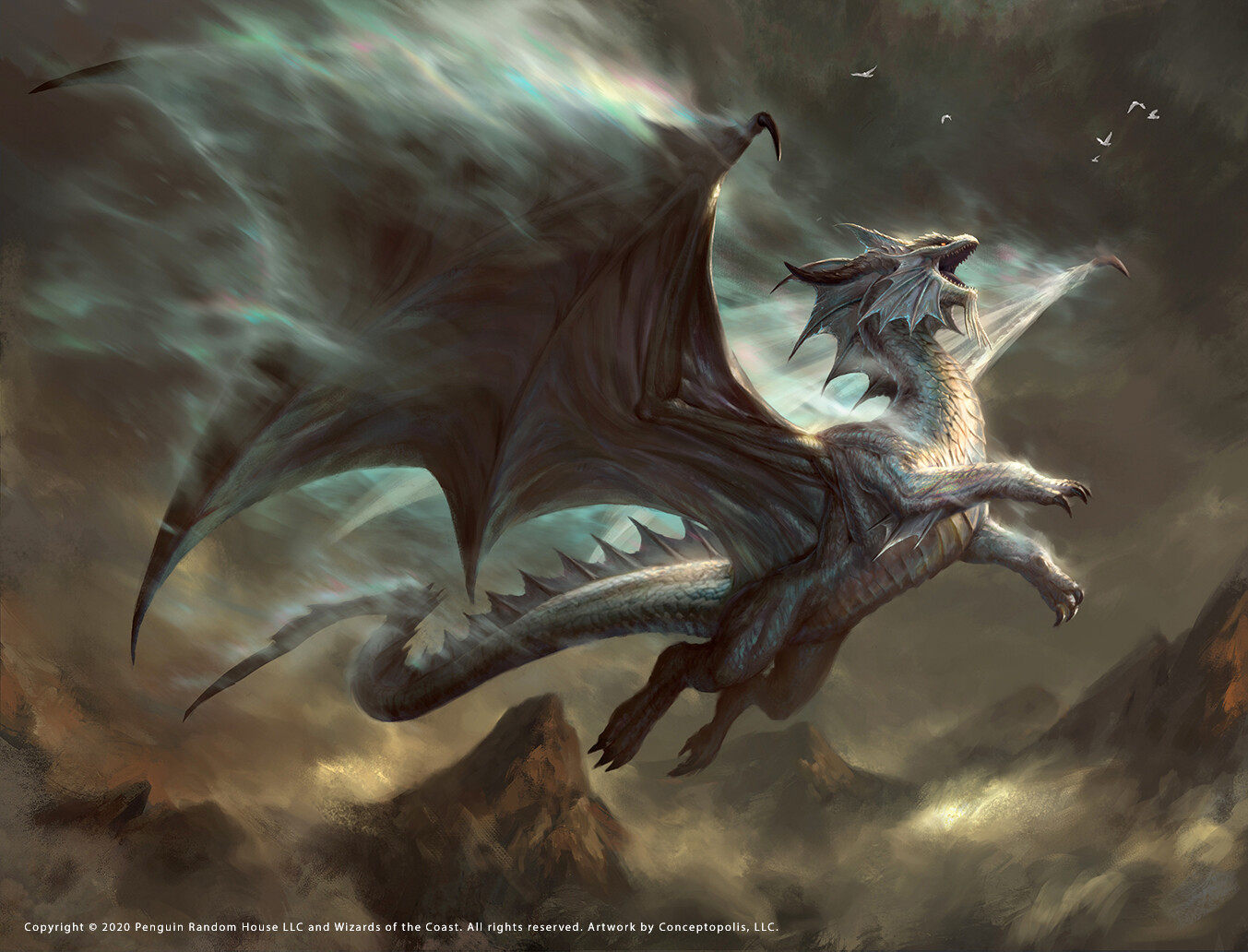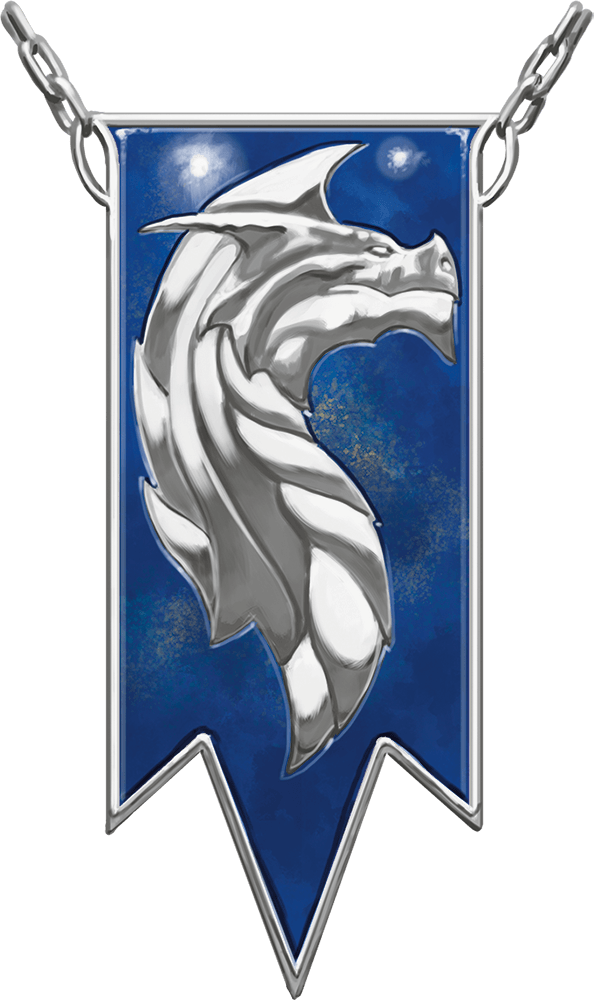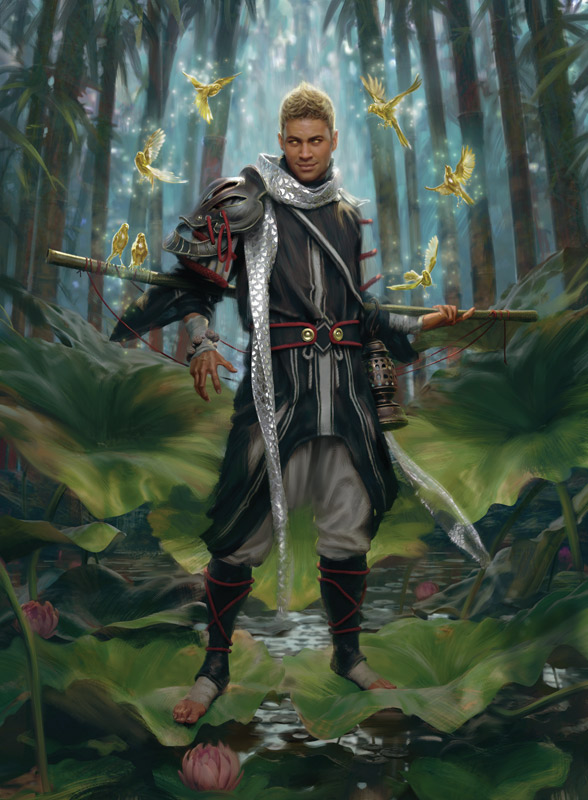Characteristics
Physical features
In his natural form, Bahamut is a massive dragon, with a tail the same length as his body, with platinum scales tougher than any shield (said by some to be virtually indestructible) that glow with a faint blue sheen, and blue eyes, the exact color of which is hard to specify and may depend on Bahamut's mood. He is described as a huge dragon wrapped in a scintillating aura of light so brilliant that it is impossible to tell his color.
When he wishes to wander the mortal world, he usually takes the appearance of an old
Human or demihuman wizard dressed in peasant robes. Some sages believe Bahamut uses this humanoid guise to not frighten non-dragon beings. They also believe that while Bahamut is fond of his old man guise, he has other guises as well. Other recorded guises include that of a prince, an urchin, a beggar, a humble fisher, or a young monk who bears the title of the "Grandmaster of Flowers".
Diet
Bahamut's favored food is the early morning frost on blades of grass, honey, and daisy petals. He is able to eat anything; however, he needs no sustenance.
Mental traits
Bahamut is stern and very disapproving of evil. He accepts no excuses for evil acts and doesn't tolerate even minor offenses by evil creatures.
In spite of his stance, he is also considered one of the most compassionate dragon. He has limitless empathy for the downtrodden, the dispossessed, and the helpless. He usually prefers to polymorph those who have offended him instead of killing them.
By draconic standards, Bahamut is neither vain nor desirous of treasure. He values wisdom, knowledge, prophecies, and songs instead. He uses the great wealth he has amassed over the ages to help those in need while using the
Magic items he has gathered to further his goals. However, he also pursues viciously (usually sending his champions and followers) those who try to steal the hoard from his palace, as, after all, he is a god of justice.
Bahamut also likes to prove the strength and worthiness of his followers by battling against them in his dragon form, halting the combat when his followers are injured or when they overcome him. However, he is prone to get carried away by his zeal and has powerful healers on hand in case he has gravely injured one of his followers in those battles.
Bahamut enjoys the company of all good dragons, delighting in their differences and varied personalities.
Worship
Worshipers
The majority of Bahamut's worshipers prior to the
Draco-Giant War were metallic dragons. While he was revered by all good dragons, gold, silver, and brass dragons held him in particularly high regard.
A knightly order dedicated to Bahamut subsist, the
Order of the Griffin, and bring Bahamut's justice to the world.
Clergy
Temples to Bahamut were extremely rare, as the Platinum Dragon didn't appreciate being honored by objects, taking into account deeds instead. Many gold, silver, and brass dragons maintained small shrines to Bahamut in their lairs, usually nothing more than Bahamut's holy symbol engraved on a wall. However, it is common to see a symbol of Bahamut in a trial court, or above a leader's throne.
Lair
Bahamut’s realm on Mount Olympus isn’t on Mount Olympus by strictest accounts, nor is it on Mertion it floats above it. The Platinum Palace is a fantastic floating fortress that flies on a solid cloud over the lower layers of the Seven Heavens, hovering above Mertion. A legion of knights and paladins train on the palace grounds in loyal service to their master.
The Platinum Palace is a kingly place where great ideals are held in high regard, and since they literally fly above the ground a true sense of arrogance is bred amongst the legions. They are noble and proud, serving Bahamut in all things, but they tend to view problems from their lofty height in the Platinum Palace.
The Platinum Palace itself is filled with spiraling towers of dazzling beauty, ivory halls, and grand amphitheaters. Bahamut has a true sense for flair and drama, and often makes proclamations that can be heard everyone on the miles-long palatial ground. Beautiful music drifts on the air from unseen sources and there are hundreds of groves of fruit-bearing trees that provide sustenance for all who come seeking refuge or advice from the Platinum Dragon.
History
Elegy for the first world
According to the ancient draconic myth Elegy for the First World,
Sardior was the first creation of Bahamut and
Feth'razaal, a dragon unlike either of its creators. With a slender form and glistening ruby scales, Sardior embodied an otherworldly beauty and majesty. As the inaugural creation of the dragon gods, Sardior was both immensely powerful and deeply cherished by its divine progenitors.
With Sardior’s guidance, countless other dragons came into being. Yet, none could rival his uniqueness. During the era of proto-dragons—a
Time when dragons possessed limited intellect but already wielded extraordinary power—Sardior stood apart. He was revered as a god alongside Bahamut and Feth'razaal, embodying wisdom and strength unmatched by his kin.
Dawn war
In the war between gods and primordials, Sardior was corrupted by a primal disease that turned proto-dragons into cannibalistic savages. Sardior transformed into a titan, gaining monstrous strength and becoming a predator of dragons, consuming his kin to grow even more powerful.
Asmodeus' Trial
After the war, many still fought as the divide between the ancients gods and the despairing gods plagued the planes, the dawn war turning into a
Celestial War. Many sought to end the conflict, yet a truce seemed impossible.
Zariel, an archangel and a former friend of both
Asmodeus and
Freya before his betrayal, sought a different path. Hoping to end the bloodshed, Zariel proposed a trial, a chance for Asmodeus to defend himself before the gods and perhaps redeem his actions.
Asmodeus, an unmatched strategist and orator, accepted the challenge. The Ancient Gods also agreed, hoping to resolve the growing tensions. Bahamut, the god of justice, offered to oversee the trial as a neutral arbiter. A contract was drawn to ensure the trial’s fairness, binding all participants to its terms. Asmodeus, unable to leave his infernal domain, sent a puppet crafted in his image to the Prime Material Plane to face the judgment of the celestial beings in a neutral territory.
Accused of corrupting mortal souls to strengthen his infernal army, Asmodeus defended his actions by appealing to the principles of law and cosmic necessity. He admitted to swaying mortals toward evil but insisted that he and his
Devils had never violated a contract. Every deal was presented with clear terms, and mortals entered into them willingly.
Have we not followed the dictates of law? Is it not mortal ambition, not infernal deception, that leads so many souls astray?— Asmodeus
Asmodeus further claimed that mortals who rejected devilish offers were left unmolested, in accordance with the law. Those who managed to outwit their infernal contracts were even freed from their debts.
A contract is law, and the law is a contract— Asmodeus
Bahamut weighed Asmodeus’s words carefully, listening as angel after angel testified against the Lord of the Nine Hells. Days turned to weeks as an overwhelming number of witnesses recounted his crimes. Eventually, Bahamut declared that the testimonies had gone on long enough and limited further accusations to only a few more voices.
Chaos erupted in the court as angels argued over who should be heard next. Amid the turmoil, Zariel pushed her way to the front, demanding to speak. The heated debate escalated into a skirmish, with angels turning on one another. Asmodeus, watching the scene unfold, could not hide his smirk.
In the end, Bahamut declined to issue a definitive judgment. Instead, he rebuked the angels for their descent into infighting but stopped short of punishing Asmodeus. However, he did impose a condition upon him: Asmodeus would carry a mighty artifact, the Ruby Rod, as a guarantee of his adherence to law.
Dawn of the Dragon Gods
Sardior’s destructive hunger divided dragonkind. While some, like
Talonixa, sought to oppose him through war, others like
Ysera advocated diplomacy. Betrayed by those who viewed Sardior as the pinnacle of draconic evolution, Sardior consumed even his supporters, becoming an unstoppable force.
Grieving over their creation, Bahamut and Feth'razaal hesitated to destroy Sardior. Eventually, a group of powerful dragons—
Alexstrasza, Ysera,
Malygos,
Nozdormu, and
Neltharion—united to confront him. Despite immense power and sacrifice, they could not kill Sardior outright. Instead, they banished him to the
Void, preventing further devastation.
Bahamut and Feth’razaal, masters of numerous divine domains—Life, Nature, Earth, Time, and Magic—chose to divide their divine essence. As a reward for their valor, they bestowed this power upon the five chosen dragons. These blessings elevated the dragons, granting them ascension to godhood.
Later, During the War of the Ancients, the ancient dragon gods trusted the newly ascended god to protect and help their kind. Tension arose between Feth'razaal and Bahamut after the betrayal of Neltharion, Bahamut believing his sister and himself should have taken action against him when Feth'razaal insisted they shouldn't get involved in mortals after, nor in other god conflicts.
After the great extinction event, dragons and giants emerged as the sole survivors in the aftermath, with mortals retreating into hiding. Many seized this opportunity to expand their territories and amass hoards, a behavior actively encouraged by Feth'razaal among the dragons.
Tensions between dragons and giants escalated gradually, culminating in the capture and abduction of two dragons:
Caelestrasz, and
Merithra. Bahamut, viewing this act as unjust, urged the dragons to take action to retrieve their kin. With Feth'razaal's rhetoric also fueling the flames, the dragons initiated what would become known as the Draco-Giant War using chromatic dragon as proxy to convey her words from her prison.
The conflict revolved around the struggle for rulership of the lands and ownership of vast hoards, among numerous other grievances. However, as casualties mounted among the dragons, Bahamut recognized the futility and madness of such a large-scale conflict. Despite his pleas for retreat, many of his followers remained steadfast, refusing to abandon their brethren. In desperation, Bahamut sought assistance from Feth'razaal.
However, Feth'razaal's refusal to aid him deepened the rift between the two dragon gods, further escalating tensions. This marked the genesis of a conflict between Bahamut and Feth'razaal, resulting in the formation of three factions among the dragons: those who believed in Feth'razaal's cause, those who opposed it, and those who remained neutral and ultimately pledged allegiance to Sardior.
The conflict between the dragon gods prevented intervention from the other deities, as they feared Feth'razaal would be freed from her prison, resulting in escalating casualties among the dragons on the battlefield. The dragons ultimately emerged victorious, banishing the giants to their own island. However, this victory came at a great cost—the dragon population was decimated, and the gods found themselves divided.
In the wake of the devastation, Bahamut and his sister, recognizing the need for unity and the preservation of their kind, reached a truce. They agreed to set aside their differences until such time as the dragon population could thrive once more on Toriel.






Comments
Author's Notes
Inspired by Bahamut from the forgotten realms